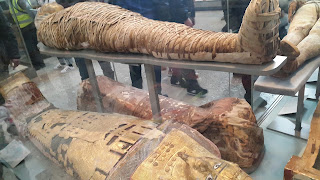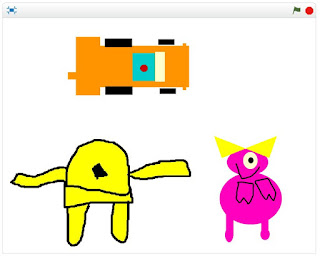We started the week with a home education workshop at the
Puppet Theatre in Norwich. The theme was ancient worlds and Solomon decided to make a puppet of an Egyptian king, which decided the specific ancient world for the rest of the week's project.
It's the second Puppet Theatre workshop Solomon has attended (
see also Project 10: Puppets and Theatre), and he's really enjoyed it both times.
 |
| Egyptian king puppet |
We watched a selection of videos about Ancient Egypt on the
BBC Teach YouTube channel, and the
Prince of Egypt on Netflix. The
Horrible Histories Awful Egyptians sticker activity book was one of the most popular sticker books Solomon has had, and he also liked Terry Deary's
The Phantom of the Nile which he sped through in one sitting (although it's only 64 pages, so it didn't last long!) and we started the classic
Horrible Histories Awesome Egyptians.
All three kids made their own Egyptian headdresses, and had a go with some
hieroglyphic stamps (bought on a previous trip to the British Museum).
 |
| Solomon's Egyptian headdress |
 |
| Hieroglyphic stamps |
Finally, we finished the week with a trip to the
British Museum to look at the Rosetta Stone and some actual mummies. We're lucky that the British Museum is only an hour away on the train, but you inevitably spend too much money in the museum shop and Solomon was disappointed that the mummies' bandages weren't generally as distinct as they tend to be in book illustrations.
 |
| Some mummies at the British Museum |
As can be expected for a civilisation that lasted over 3,000 years - we will have to return to the topic in the future!
Next week's project: World Book Day and the Wizard of Oz










